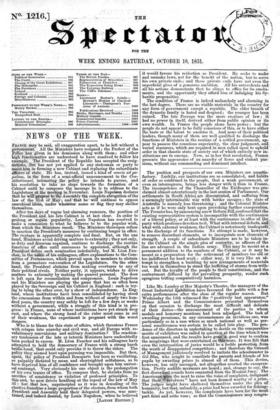NEWS OF THE WEEK.
FRANCE may be said, all exaggeration apart, to be left without a goternment. All the Ministers hive resigned ; the Prefect of the Police has given in his "demission along with them ; and other high functionaries are understood to have resolved to follow his example. The President of the Republic has accepted the resig- nations, but has not yet applied to' any statesman or party to assist him in forming a new Cabinet and replacing the subordinate officers of stater_ He has, instead, issued a kind of condo ad po- pulum, in the • forin of .a semi-official announcement in the Con- stitutionnel, intimating policy he intends to pursue, and his resolution to take no steps towards the formation of a Cabinet until he composes the message he is to address to the Legislature at. the meeting in November. Louis Napoleon declares that he wit propese to the Assembly the coMplete abrogation of the law of the 31st of 2f14-; -ruid=that he` will continue to oppose anarchical ideas, under whatever name or flag they may shelter themselves.
After ten days of va.ue but alarming rumours, the position of the President_ and his late Cabinet is at last clear. In order to prolong or regain 'popularity, - Louis Napoleon has resolved to make a concession to whit he believes to be the popular wish, from which the Ministers reeoiL The Ministers thereupon refuse to sanction the President's measures by continuing longer in office. The rupture is apparently complete and final. But, on the one hand, Ministers avoid driving matters to extremity ;'they not only, as duty and decorum required, continue to discharge the routine functions of office until successors be appointed, although the President defers mph nomination indefinitely, but M. Leon Fatt- Cher, in the naine.of his colleagues' offers, xplanations to the Com- mittee of Permanence, which prevail upon its members to abitain from a premature convocation of the Legislature. On the other hand, the President abitains from making overtures to any of their political rivals. Neither party, it appears, wishes to drive matters to extremity by making the quarrel personal. The door is left open for reconciliation and compromise. Louis Napoleon and his Ministers are playing the game that has so often been played by the Sovereign and his Cabinet in England : each is try- ing to bring the other over, by a show of independence. In Eng- land, where institutions have been consolidated by having stood the concussions from within and from without of nearly two hun- dred years, the country may safely be left for a few days or weeks Without a government, while a struggle of this kind is in pro- gresi: in France, none of whose institutions have yet struck deep root, and where the strong hand of the ruler must come in aid of their weakness, the experiment is pregnant with the worst dangers.
- Who is to blame for this state of affairs, which threatens France with relapse into anarchy and civil war, and all Europe with re- velutionary convulsions and military domination P The reaction- ary tendencies of the late or interim Ministers have undoubtedly been pushed to excess. M. Leon Faucher and his colleagues have attempted to hold the democracy of France with a strong harsh bridle-hand, that could only provoke it to throe- the riders. The policy they seemed bent upon pursuing was impossible. But then, again; the • policy of President Bonaparte has been so vacillating, so palpably dictated- by mean -and- shortsighted selfishness, as to have deprived. him of all confidence and brought upon him univer- sal contempt. Very obviously his one object is the prolongation of his own tenure of office. To compass that, he shrinks from no sacrifice of consistency or violation of professed principles.. To this end, -he now drives headlong at the repeal of the law of May 31 : bat that law, unprincipled as it was in denuding of the elective franchise a large proportion of the electors, from whom both President and Assembly held their delegated powers, was sanc- tioned, and indeed desired, by Louis Napoleon, when he believed
it would favour his reelection as President. He seeks to make and unmake laws, not for the benefit of the nation, but to serve his own private ends ; and those private ends have not even the superficial gloss of a generous ambition. All his antecedents and all his actions demonstrate that he clings to office for its emoln- meats, and the opportunity they afford him of indulging his Sy- baritic propensities. -
The condition 'of France is indeed melancholy and alarming in the hit degree.. There are no visible materials in the country for any form of government except a republic. The elder branch of the dynastic family is hated and despised; the younger has been ruined. The late Peerage was the mere creature of law ; it had no power in itself, derived either from public opinion or its own wealth. In France the people alone have power ; but the people do not appear to be fully conscious of this, or to have either the taste or the talent to exercise it. And none of their political leaders, though many of them are well qualified to discharge the functions of Ministers in the routine of a settled government, ap- pear to possess the conscious superiority, the clear judgment, and varied resources, which are required in men called upon to uphold order in that chaotic state of society out of which entirely new in- stitutions are to emerge. Now, as in her first revolution, France presents the appearance of an anarchy of fierce and violent pas-. mons, without one commanding and dominant intellect.


























